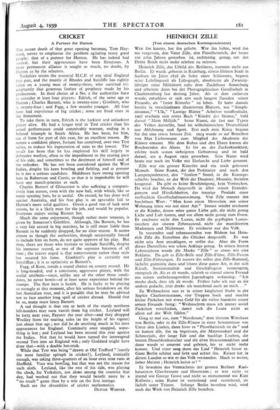CRICKET
A Partner for Hutton
THE recent death of that great opening batsman, Tom Hay- ward, serves to emphasise the problem agitating many good people: that of. a partner for Hutton. He has indeed had several, but their appearances have been flirtatious. A more permanent alliance is sought as much, no doubt, by Hutton as by the selectors.
Yorkshire seems the essential H.C.F. of any ideal England first pair, and the mantle of Rhodes and Sutcliffe has rightly fallen on a young man of twenty-three, who survived tri- umphantly that generous fanfare of prophecy made by his predecessor. In their choice of a No. z the authorities have to consider at least four players: Edrich, of the same age as Hutton ; Charles Barnett, who is twenty-nine ; Gimblett, who is twenty-four ; and Fagg, a few months younger. All four have had experience of big cricket ; none are fixed stars in the firmament.
To take them in turn, Edrich is the luckiest and unluckiest player alive. He had a longer trial in Test cricket than his actual performance could conceivably warrant, ending in a belated triumph in South Africa. He has been, for him, out of form for part of this year, for an excellent reason. By nature a confident player, fortune has contrived, over two Test series, to reduce his expectation of runs to the lowest. The result has been that he has employed his skill largely in defensive warfare, often to the impediment to the scoring pace of his side, and sometimes to the detriment of himself and of the onlooker. He has not been considered against the West Indies, despite his keen bowling and fielding, and at present he is not a serious candidate. Middlesex have strong opening bats in Robertson and Carris, so that it is improbable he will have any match-practice as such.
Charles Barnett of Gloucester is also suffering a compara- tively lean season, even with the new ball, with which, like so many opening bats, he is useful. On record, he has done well against Australia, and his free play is an agreeable foil to Hutton's more solid qualities. Given a good run of luck next season, he is a likely man for the job, and would be popular. Everyone enjoys seeing Barnett bat.
Much the same enjoyment, though rather more tenuous, is given by Somerset's Gimblett. Although, like Barnett, he has a very fair record in big matches, he is still more liable than Barnett to be suddenly dropped, for no clear reason. It seems almost as though the authorities, though occasionally forced to include him on form, do not quite approve of his play. But then, there are those who hesitate to include Sutcliffe, despite his immense record, as one of the supreme batsmen of all time ; the reason urged is that temperament rather than style has secured his fame. Gimblett's play is certainly not Sutcliffian ; it is as optimistic as Barnett's.
Fagg, of Kent, stands a sound chance on county record. He is long-headed, and a consistent, aggressive player, with the useful attribute—since, unlike any of the other three candi- dates, he never bowls—of at least some experience behind the stumps. The flaw here is health. He is lucky to be playing so strongly at this moment, after his serious breakdown on the last Australian tour, and it is possible that he may be advised not to face another long spell of cricket abroad. Should that be so, many must fancy Barnett.
A sad thought is that one or both of the sturdy northern left-handers may soon vanish from big cricket. Leyland will be forty next year, Paynter the year after—and they dropped Woolley from the touring sides (at the height of his vigour) just about that age ; nor did he do anything much in his later appearances for England. Continuity once snapped, some- thing is lost ; and Leyland has been missed this year against the Indies. Not that he would have turned the interrupted second Test into an England win; only Goddard might have done that—with a double hat-trick.
While that Test was being " drawn at Old Trafford " (surely the most familiar epitaph in cricket?), Leyland, ironically enough, was taking three-quarters of an hour over nine runs at Sheffield. Voce was bowling, but that was not the reason for such sloth. Leyland, like the rest of his side, was playing the dock, for Yorkshire, not alone among the counties that day, had worked out that they would benefit more by a " no result " game than by a win on the first innings.
Such are the absurdities of cricket mathematics.
OLIVER WARNER.








































 Previous page
Previous page